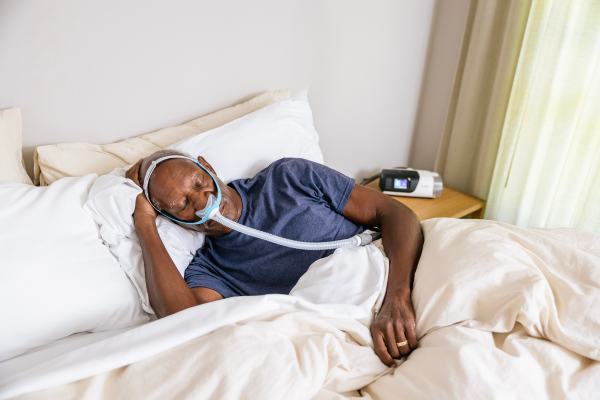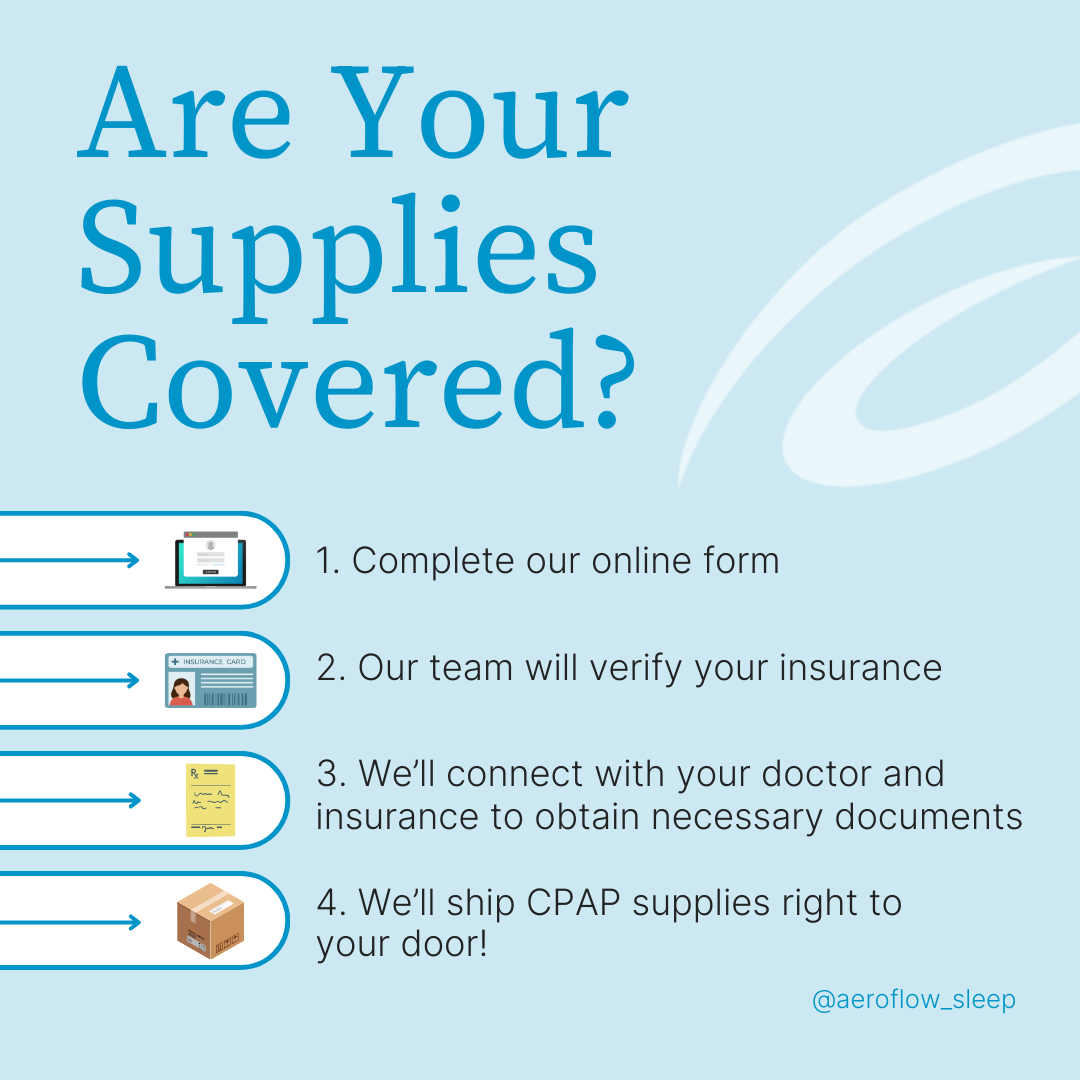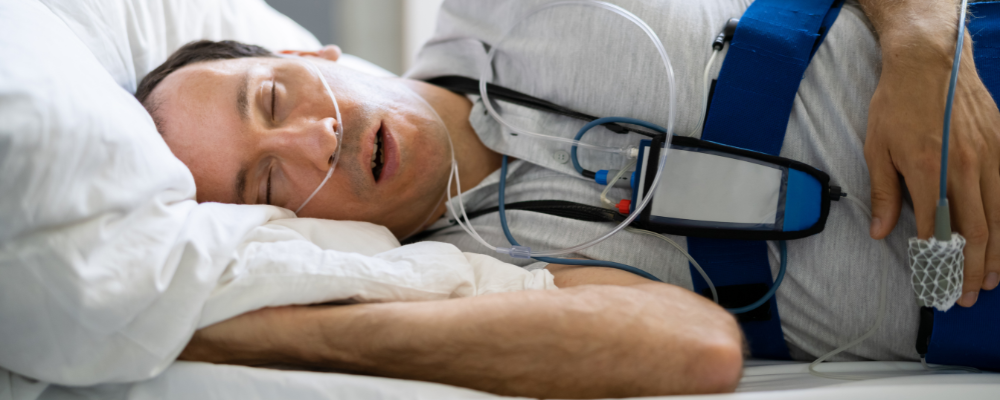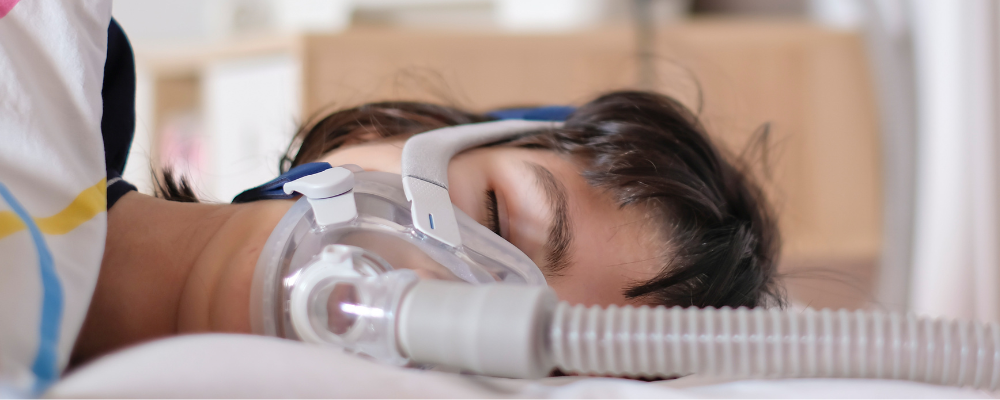Let me set the scene: it’s a dark, stormy October night. One moment you’re running as fast as you can from Michael Myers, and the next you’re in your bed, awake, and gasping for air. You can picture it, right?
We’ve all been spooked by a nightmare or two at some point. But what if your bad dreams were being caused by sleep apnea? Keep reading to find out more, plus insight from Dr. Carleara Weiss and how Aeroflow Sleep can help.
Can Sleep Apnea Cause Nightmares?
Yes, nightmares could be caused by your sleep apnea. Obstructive Sleep Apnea (OSA) occurs when your upper airway is blocked while sleeping, which causes your breathing to stop. In recent studies, it was found that OSA patients’ frequent sleep disruptions and lack of oxygen could potentially trigger parasomnias (or experiences that interrupt regular sleep;) like nightmares. These disturbing dreams may consist of what some sleep apnea patients have described as nightmares of suffocation or drowning.
However, interestingly enough, while some sleep apnea patients report frequent nightmares, others report having a low number of nightmares. According to the Journal of Sleep Medicine, patients with a high Apnea-Hypopnea Index (AHI) often report a lower number of nightmares.
Dr. Weiss Defines AHI: Patients who have a higher AHI are patients who have severe sleep apnea. The Apnea-Hypopnea Index is used to determine severity of a sleep apnea diagnosis and refers to how many times a person stops breathing partially or completely per hour of night’s sleep.
This makes sense, because cognitive issues are a common side effect of severe sleep apnea. These cognitive issues could result in lower dream recall, making it more difficult for the brain to remember unpleasant dreams.
In short, your sleep apnea could be causing nightmares, and if you have severe sleep apnea, you could also be experiencing nightmares that you don’t necessarily remember when you wake up.
Can Lack Of Oxygen While Sleeping Cause Nightmares?
One 2019 study suggests, “A lack of oxygen in patients who aren’t treating their sleep apnea is thought to be a possible trigger for nightmares.” This means a lack of oxygen while sleeping could potentially be one of the causes of frequent nightmares. However, nightmares can be caused by more than just sleep apnea or a lack of oxygen. We’ll break down other common causes in the next section.
Why Am I Waking Up To Nightmares?
You may be waking up to nightmares for a number of reasons. Nightmares can be a result of many different factors; including stress, mental health disorders, sleep deprivation, and certain medications. That’s just to name a few! If you are experiencing regular nightmares, we recommend letting your doctor know, because while your nightmares might not necessarily point to a sleep apnea diagnosis, they could be a warning sign of a different health concern.
Additionally, while we’re on the topic, it’s important for us to note that nightmares are different from night terrors. Nightmares cause you to actually wake up. Night terrors are episodes of screaming or flailing while still sleeping, and you don’t typically remember once you do wake. Again, if you or your loved one suspect you may be experiencing night terrors, you should reach out to your doctor.
Do You Dream Less With CPAP?
Although Continuous Positive Airway Pressure (CPAP) can treat your sleep apnea, you do not dream less with it. Most dreams happen when your body is in REM sleep; the Rapid Eye Movement stage of your sleep cycle. During REM sleep, your body is in a deep sleep, which can lead to more vivid dreams. When you have sleep apnea, this deep sleep is interrupted when your body stops breathing. Thus, when you treat your sleep apnea using CPAP, your body is able to spend more time in deep sleep.
In fact, CPAP therapy could actually lead to more dreams, because it directly combats deep sleep interruptions. Dr. Weiss recalls, “I had one patient complain that CPAP was causing nightmares,” rather than the sleep disorder itself, “[and this] is not true. They notice more nightmares, because they are sleeping more and getting more REM.”


But still…can CPAP reduce your sleep apnea nightmares? Yes, the same sleep experts of that 2019 study found, “91% of sleep apnea patients who regularly used their CPAP machine saw less frequent nightmares, compared to 36% of patients who did not regularly use CPAP therapy.” Furthermore, the Journal of Clinical Medicine’s 2020 study found, “CPAP therapy significantly improved sleep apnea symptoms, and in turn, reduced the number of nightmares in elderly patients with severe OSA.”
How Do You Know If You Have Sleep Apnea?
Nightmares are not a surefire way to know if you have sleep apnea, so the best way to know if you do have sleep apnea is by paying a visit to your doctor. If you begin to notice sleep apnea symptoms—loud snoring, gasping for air when you wake up, or daytime sleepiness, consult with your primary care physician. They will likely recommend a polysomnography (or a sleep test), which can be completed either in a lab or at your home, to determine if you have a sleep disorder. After your sleep study, if you are diagnosed with sleep apnea, that’s when Aeroflow Sleep can help.
Aeroflow Sleep assists you in ordering your PAP supplies through insurance, so that you can save time, energy, and money on securing your medical equipment. We’re also committed to ensuring your PAP therapy is both comfortable and best suited to your unique needs, using unique tech the competition doesn’t. Once you’ve been diagnosed with sleep apnea, call us or fill out our online qualifying form; we’ll take care of the paperwork and other insurance logistics.
If you’re not a part of the Aeroflow Sleep family yet, we invite you to join us! We’re happy to help you achieve better dreams and a better night’s sleep.
References
BaHammam, Ahmed S, and Aljohara S Almeneessier. “Dreams and Nightmares in Patients With Obstructive Sleep Apnea: A Review.” Frontiers in neurology vol. 10 1127. 22 Oct. 2019, doi:10.3389/fneur.2019.01127
Pagel, J F, and Carol Kwiatkowski. “The nightmares of sleep apnea: nightmare frequency declines with increasing apnea hypopnea index.” Journal of clinical sleep medicine : JCSM : official publication of the American Academy of Sleep Medicine vol. 6,1 (2010): 69-73.
Edwards, Scott. “Nightmares and the Brain.” Harvard Medical School, 2015, hms.harvard.edu/news-events/publications-archive/brain/nightmares-brain.
Pacheco, Danielle, and Heather Wright. “Night Terrors.” Sleep Foundation, 28 Sept. 2023, www.sleepfoundation.org/parasomnias/night-terrors.
Summer, Jay. “REM Sleep Revealed: Enhance Your Sleep Quality.” Edited by Abhinav Singh, Sleep Foundation, 12 Oct. 2023, www.sleepfoundation.org/stages-of-sleep/rem-sleep.
Posadas, Tomas et al. “Treatment with CPAP in Elderly Patients with Obstructive Sleep Apnoea.” Journal of clinical medicine vol. 9,2 546. 17 Feb. 2020, doi:10.3390/jcm9020546











